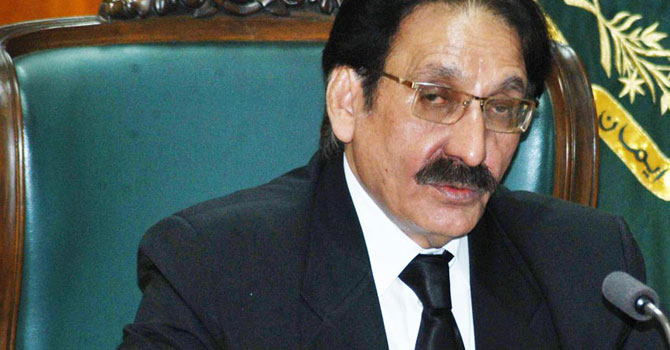ISLAMABAD: As Chief Justice Iftikhar Muhammad Chaudhry celebrates his 64th birthday on Wednesday (today), he faces the daunting task of clearing a backlog of 1.6 million cases both in the superior and the lower judiciary.
Elevated as the 20th Chief Justice of Pakistan in June 2005, he will be among the three most influential figures in the country to complete their tenures next year. He will doff his robes on this day next year.
First to go after completing his five-year tenure on Sept 8, 2013, will be President Asif Ali Zardari, followed by Army Chief Gen Ashfaq Parvez Kayani in the last week of November.
The entire tenure of the chief justice has been tumultuous, beginning with his removal from office twice in 2007. He was first deposed by former president Pervez Musharraf in March of 2007 and a reference against him was filed with the Supreme Judicial Council.
The chief justice had to leave his office again and was held incommunicado in his official residence when Gen Musharraf declared emergency in November of 2007.
The CJP was eventually reinstated on March 22, 2009, following a massive public resentment and countrywide protest marches.
The last two years have proven to be rather bad for the judiciary as well. Its image was first blemished because of the memo scandal when allegations of collusion between the judiciary and the military were levelled.
And when the judiciary had barely recovered from the accusation, allegations of wrongdoing were hurled at Dr Arsalan Iftikhar, a son of the chief justice, by property tycoon Malik Riaz.
Although legal observers described the years with the chief justice at the highest echelon of the judiciary as eventful, they are pinning hopes on focus and improvement during the next year on the working of lower courts which are considered to be the real face of the judiciary.
A number of senior counsel approached by Dawn praised the initiatives of a series of public interest litigations (PIL) aimed at protecting social, economic and religious rights of the people, but at the same time they stressed the need for drastic enhancement in lower ranks of the judiciary.
“I hope the judicial system will see a marked change since the public at large has been affected,” said Tariq Mehmood, former president of the Supreme Court Bar Association (SCBA). He was of the opinion that much improvement was needed on the case management system at the level of the subordinate judiciary since the handling of family matters and cases on criminal as well as civil sides left much to be desired, adding that the sufferings of poor litigants had not been ameliorated.
“The excessive use of PIL, especially by invoking the suo motu jurisdiction, overshadows the normal litigation,” Mr Mehmood said and reminded that although PIL was meant to benefit ordinary citizens, early resolution of normal cases would also serve the same cause.
Realising the excessive use of PIL cases, the Pakistan Bar Council and the SCBA have adopted resolutions stressing the need for a law that provides a provision to challenge verdicts issued by the superior courts in suo motu cases.
“Courts cannot bring revolutions,” said Dr Muhammad Abdul Basit, the author of a book on law of contempt of the court, adding in a guarded language that a cautious exercise of the authority would be much appreciated.
The entire era was full of both positives and negativities, Dr Basit said. Although he appreciated the strong protective wall against corruption, he was against too much use of suo motu powers.
Advocate Waqar Rana called for focusing more on litigants’ problems and said the judiciary should mark the next year with a campaign to weed out corruption in its ranks and files at all levels.
He said people had pinned hopes on the judiciary after its restoration, but it had failed to come up to their expectations as the performance at the lowest tier of the judiciary remained a question mark.













































